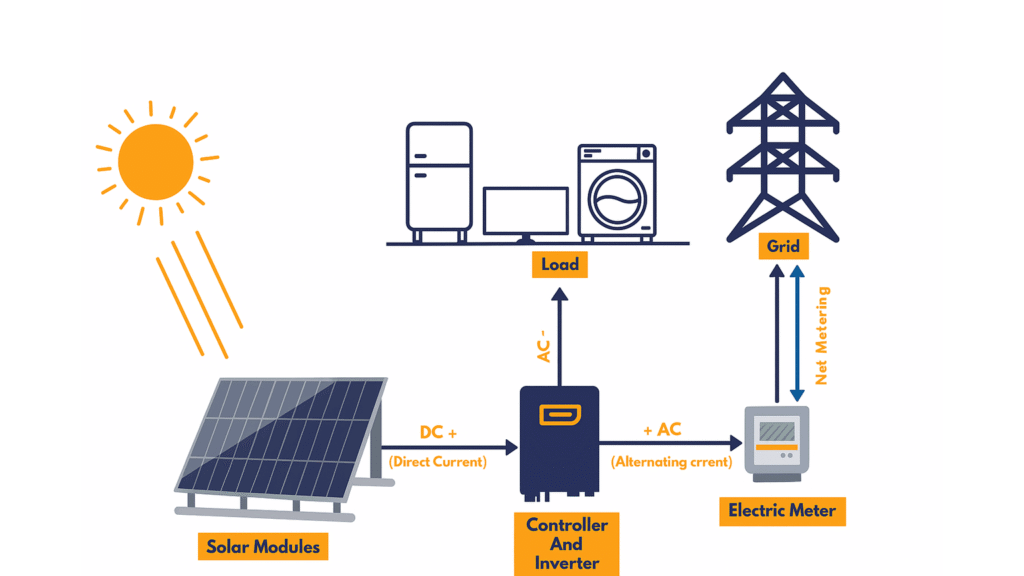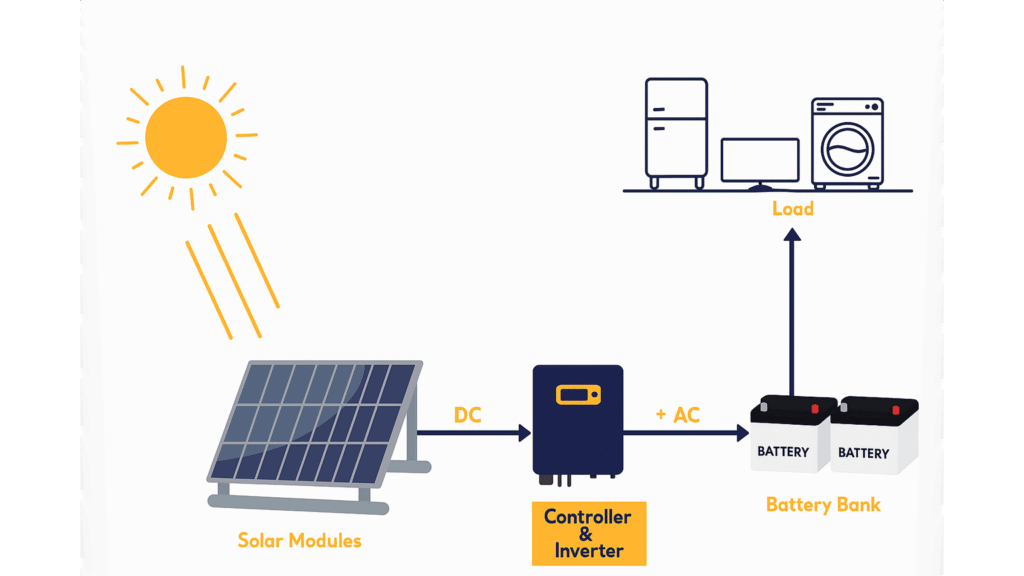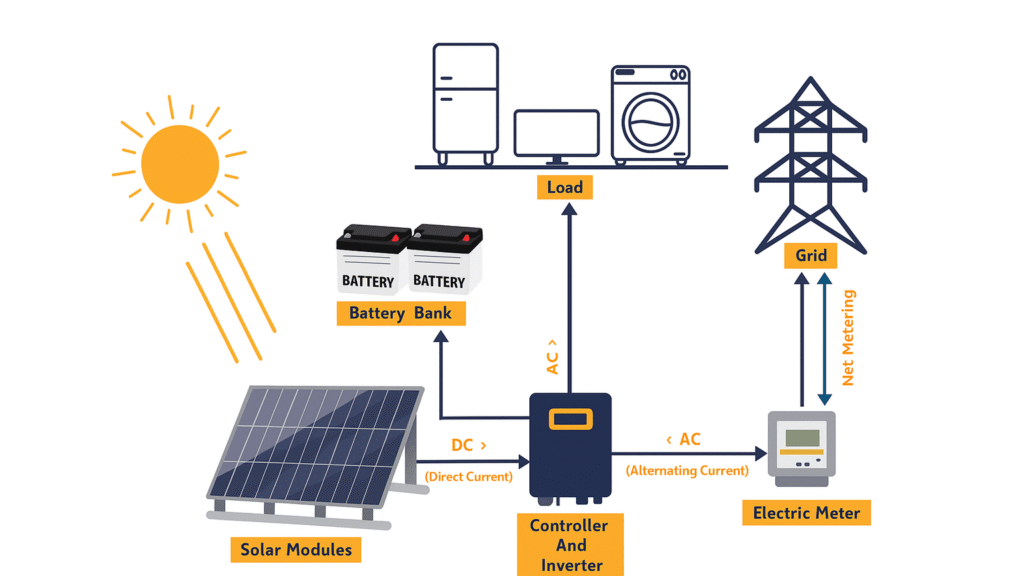The world is increasingly shifting toward clean energy solutions, and one of the most practical ways for homeowners to contribute to a sustainable future is by installing a solar rooftop system. With rising electricity costs and the growing need to reduce carbon footprints, solar energy has become a reliable and cost-effective choice for both urban and rural households across India.
But here comes the big question: Which solar system is best for your home? Should you go with an on-grid solar system, an off-grid solar system, or a hybrid solar system?
In this blog, we’ll explore each type of solar system, highlight their advantages and disadvantages, provide a side-by-side comparison, and guide you to choose the best solar solution for your home.
What is an On-Grid Solar System?
An on-grid solar system, also called a grid-tied solar system, is directly connected to the electricity grid. During the day, it generates electricity from solar panels, allowing your home to use solar power first. However, if your energy demand exceeds what the panels produce, the system automatically draws additional power from the grid. Thus, an on-grid solar system provides a reliable and continuous electricity supply for your home while maximizing solar energy usage.
This type of system is widely adopted in urban areas like Bangalore, where the grid is stable and households want to save on monthly electricity bills.
How It Works:
- Solar panels absorb sunlight and generate DC electricity.
- The solar inverter converts DC into AC electricity to power home appliances.
- During the daytime, your home runs on solar power.
- At night or when demand is higher, the grid supplies additional electricity.

Advantages of On-Grid Solar System:
- Lower initial investment compared to off-grid and hybrid.
- Helps reduce your electricity bills by prioritizing solar energy.
- Easy to install and requires minimal maintenance.
- Best suited for urban homes with reliable electricity connections.
- Eligible for government solar rooftop subsidies.
Disadvantages of On-Grid Solar System:
- Does not provide backup during power cuts.
- Depends on the availability of a grid connection.
- Not suitable for remote areas without grid access.
What is an Off-Grid Solar System?
An off-grid solar system operates independently of the electricity grid and stores energy in solar batteries. As a result, it’s an ideal solution for areas with frequent power outages or no grid connection. This setup ensures 24/7 electricity for your home, entirely powered by solar panels and battery storage.
How It Works:
- Solar panels generate electricity.
- A charge controller regulates the flow of electricity to batteries.
- Solar batteries store energy for use at night or on cloudy days.
- The solar inverter converts DC power into usable AC power for your home.

Advantages of Off-Grid Solar System:
- Independence from utility companies and rising tariffs.
- Provides reliable power in remote/rural areas.
- Works even during power outages.
- Ensures energy security for your home.
Disadvantages of Off-Grid Solar System:
- Higher upfront cost due to batteries.
- Batteries require maintenance and eventual replacement.
- Energy availability depends on storage capacity.
What is a Hybrid Solar System?
A hybrid solar system combines the advantages of both on-grid and off-grid systems. It not only connects to the grid but also stores excess power in batteries, ensuring your home uses solar energy first, followed by battery backup, and finally grid supply if needed. Therefore, a hybrid solar system in Bangalore is an ideal choice for households seeking uninterrupted power and lower energy bills.
How It Works:
- Solar panels generate electricity during the day.
- Power is used directly by your home.
- Excess energy is stored in batteries.
- At night or during power cuts, batteries provide electricity.
- When needed, the grid acts as a backup source.

Advantages of Hybrid Solar System:
- Provides backup during power cuts.
- Reduces electricity bills by maximizing solar usage.
- Offers long-term reliability with both storage and grid options.
- Suitable for both urban and semi-urban homes.
Disadvantages of Hybrid Solar System:
- Higher initial investment.
- Batteries require periodic maintenance.
- Slightly more complex installation compared to on-grid.
On-Grid vs Off-Grid vs Hybrid Solar Systems
| Features | On-Grid Solar System | Off-Grid Solar System | Hybrid Solar System |
|---|---|---|---|
| Grid Connection | Yes | No | Yes + Battery backup |
| Power Backup | No | Yes | Yes |
| Cost | Lowest | High | Higher |
| Suitable For | Urban areas, stable grid | Remote/rural, power cut areas | Urban & semi-urban |
| Maintenance | Low | Medium (battery care) | Medium |
| Subsidy Eligible | Yes | No | Yes (for rooftop) |
| Lifespan | 25+ years (panels) | 20–25 years + batteries | 20–25 years + batteries |
Factors to Consider When Choosing a Solar System
When deciding between on-grid, off-grid, or hybrid solar systems, consider:
- Your electricity usage (high-demand homes may need a hybrid).
- Budget (on-grid is the most cost-effective).
- Location (urban vs. rural).
- Grid reliability (frequent power cuts or stable supply).
- Government subsidies (available for rooftop installations).
- Future needs (battery addition for backup).
Power Planet Solar – Best Solar Company in Bangalore:
At Power Planet Solar, we are committed to helping households switch to renewable energy systems with confidence and ease.
Here’s why we are the best solar company in Bangalore:
- Customized Solutions: We recommend the best solar system for residential rooftops in Bangalore based on your energy needs.
- End-to-End Installation: From solar panel installation to complete setup, we manage everything.
- Subsidy Guidance: Hassle-free assistance with applying for solar rooftop subsidies.
- Trusted Brands: Panels and inverters from top manufacturers like Tata and Pixon.
- After-Sales Service: Reliable maintenance and customer support.
- Eco-Friendly Living: Partnering with us means contributing to a GoGreen lifestyle and a sustainable future.
Learn more about our services at Power Planet Solar
Conclusion
If you live in a city with stable electricity, an on-grid solar system is the most affordable and efficient option. However, if you seek complete independence or face an unreliable grid, an off-grid system is ideal. Alternatively, a hybrid solar system combines savings with backup power. Ultimately, whichever system you choose, switching to solar ensures long-term savings, energy independence, and a greener future.
FAQs
A solar rooftop system involves installing solar panels on your roof to generate clean energy for your home. By harnessing solar power, it not only helps reduce your electricity bills but also contribute to a sustainable and eco-friendly future.
Choosing the best solar system for your home depends on your energy needs. If affordability is your priority, an on-grid solar system is the most cost-effective option. However, if you want complete energy independence, an off-grid system is ideal. Alternatively, a hybrid solar system provides the best of both worlds, offering savings along with backup power.
A solar rooftop system is one of the best investments for homeowners. Not only does it reduce electricity bills, but it also increases property value and supports the adoption of renewable energy. Although the initial installation cost can be high, it pays off over time, making it a cost-effective and sustainable solution.
Yes! With the right rooftop solar panel installation, you can efficiently run air conditioners, refrigerators, and other high-power appliances. For homes with higher energy demands, a 3kW to 5kW rooftop solar system is recommended to ensure sufficient power supply and optimal performance.
For a small household, a 3kW solar system is usually enough. For larger homes with multiple appliances, a 5kW solar rooftop system or more may be required. The right size depends on your monthly electricity usage.
No, Solar panels generate electricity only during sunlight hours. However, with battery storage in off-grid or hybrid solar systems, you can store excess daytime energy and use it at night, ensuring a continuous and reliable power supply for your home.
In Bangalore, Power Planet Solar is a leading solar company for residential rooftop installations. We offer end-to-end services, including system design, professional installation, subsidy assistance, and reliable after-sales support, ensuring a seamless solar experience for homeowners.
The PM Surya Ghar Muft Bijli Yojana is a government scheme that offers subsidies up to 40% for residential solar rooftop systems. It helps homeowners reduce costs while adopting renewable energy.
Choosing the right solar system depends on your lifestyle and location. If you want a cost-effective solution, an on-grid solar system is ideal. For energy independence, an off-grid system is best, while a hybrid solar system offers the perfect balance of savings and backup power.
Subsidy rates for hybrid solar systems vary depending on the system size and government guidelines. Eligible homeowners can typically avail a 30–40% subsidy under the National Rooftop Solar Scheme, making solar installation more affordable and cost-effective.
A hybrid solar system typically lasts around 25 years for the panels and 7–10 years for the batteries. With proper maintenance, it provides long-term clean energy, reliable performance, and significant savings for your home.
You can upgrade an existing on-grid solar system to a hybrid system by adding batteries and a compatible inverter. This upgrade enables your home to benefit from both electricity bill savings and reliable backup power.
